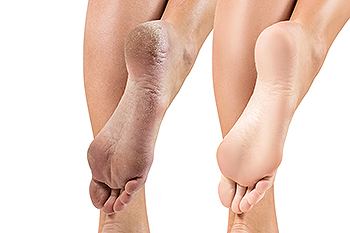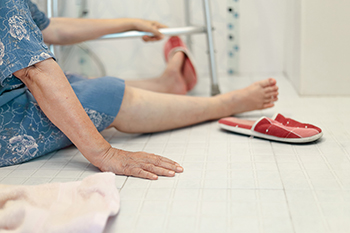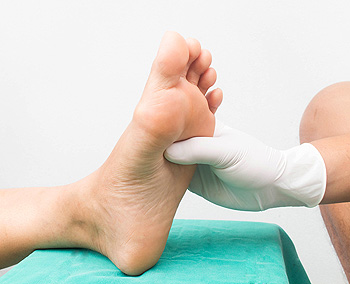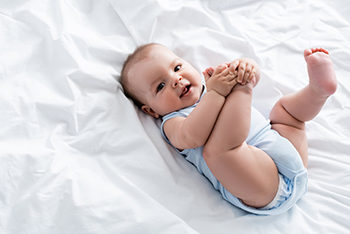Connect With Us
Blog
Items filtered by date: January 2024
Pain Management for Cracked Heels

Effective pain management for cracked heels, or heel fissures, is essential to alleviate discomfort and promote healing. Cracked heels often occur due to dry skin, lack of moisture, or underlying medical conditions. To address the pain associated with this condition, several strategies can be employed. Moisturization is key. Exfoliation can also help, but excessive scrubbing can worsen the condition. Foot soaks in warm water can soften the skin and provide relief. Well-fitting footwear with adequate cushioning plays a role in pain management as well. Avoid open-back shoes or sandals that may exacerbate the issue. Heel cups or orthotic insoles may help reduce pressure on the cracked areas and provide additional support. If you have persistent cracked heels or they appear infected, it is suggested that you schedule an appointment with a podiatrist who can provide relief and additional treatment options.
Cracked heels are unsightly and can cause further damage to your shoes and feet. If you have any concerns, contact one of our podiatrists from Crosstown Podiatry. Our doctors can provide the care you need to keep you pain-free and on your feet.
Cracked Heels
Cracked heels appear unappealing and can make it harder for you walk around in sandals. Aside from looking unpleasant, cracked heels can also tear stockings, socks, and wear out your shoes. There are several methods to help restore a cracked heel and prevent further damage.
How Do You Get Them?
Dry skin is the number one culprit in creating cracked heels. Many athletes, walkers, joggers, and even swimmers suffer from cracked heels. Age and skin oil production play a role to getting cracked heels as well.
Promote Healing
Over the counter medicines can help, especially for those that need instant relief or who suffer from chronic dry feet.
Wear Socks – Wearing socks with medicated creams helps lock in moisture.
Moisturizers – Applying both day and night will help alleviate dryness which causes cracking.
Pumice Stones – These exfoliate and remove dead skin, which allows for smoother moisturizer application and better absorption into the skin.
Change in Diet
Eating healthy with a well-balanced diet will give the skin a fresh and radiant look. Your body responds to the kinds of food you ingest. Omega-3 fatty acids and zinc supplements can also revitalize skin tissue.
Most importantly, seek professional help if unsure how to proceed in treating cracked heels. A podiatrist will help you with any questions or information needed.
If you have any questions, please feel free to contact our offices located in Wayne, Montclair, and Randolph, NJ . We offer the newest diagnostic and treatment technologies for all your foot care needs.
Foot and Ankle Injuries From Volleyball

Volleyball is a popular sport worldwide. Players of all ages and skill levels can enjoy the game, with many competing at the international level. Due to the physical demands of volleyball, players can experience various injuries, both acute and overuse. Common acute injuries in volleyball are ankle sprains, often caused during jumps from blocking or spiking. Overuse injuries include patellar tendinitis, or jumper's knee, and patellofemoral syndrome, resulting from repetitive jumping and landing. Managing these injuries involves cold therapy, anti-inflammatory medication, and exercises to strengthen and stabilize the affected areas. Achilles tendinitis is another common overuse injury, particularly among indoor players, caused by repetitive jumping on hard surfaces. Peroneal tendinitis may occur in players with high arches due to frequent dorsiflexion and eversion movements. Plantar fasciitis is common due to repetitive jumping and inadequate arch support. Prevention involves stretching, conditioning, proper technique, and pronation control. Furthermore, hyperextension and hyperflexion injuries, such as turf toe or toe folding, can occur. Taping, wearing appropriate footwear, and orthoses may help to prevent and treat these injuries. If you play volleyball and have incurred a foot or ankle injury, it is suggested that you schedule an appointment with a podiatrist for a proper diagnosis and treatment so you can get back to your game as soon as possible.
Ankle and foot injuries are common among athletes and in many sports. They can be caused by several problems and may be potentially serious. If you are feeling pain or think you were injured in a sporting event or when exercising, consult with one of our podiatrists from Crosstown Podiatry. Our doctors will assess your condition and provide you with quality foot and ankle treatment.
Common Injuries
The most common injuries that occur in sporting activities include:
- Achilles Tendonitis
- Achilles Tendon Rupture
- Ankle Sprains
- Broken Foot
- Plantar Fasciitis
- Stress Fractures
- Turf Toe
Symptoms
Symptoms vary depending upon the injury and in some cases, there may be no symptoms at all. However, in most cases, some form of symptom is experienced. Pain, aching, burning, bruising, tenderness, tightness or stiffness, sensation loss, difficulty moving, and swelling are the most common symptoms.
Treatment
Just as symptoms vary depending upon the injury, so do treatment options. A common treatment method is known as the RICE method. This method involves rest, applying ice, compression and elevating the afflicted foot or ankle. If the injury appears to be more serious, surgery might be required, such as arthroscopic or reconstructive surgery. Lastly, rehabilitation or therapy might be needed to gain full functionality in the afflicted area. Any discomfort experienced by an athlete must be evaluated by a licensed, reputable medical professional.
If you have any questions, please feel free to contact our offices located in Wayne, Montclair, and Randolph, NJ . We offer the newest diagnostic and treatment technologies for all your foot care needs.
Safeguarding Seniors Against Accidental Tumbles

As our loved ones age, ensuring their safety becomes paramount, with a particular focus on preventing falls. Begin by creating a well-lit environment, reducing tripping hazards like loose rugs, and securing electrical cords. Install handrails in key areas to provide additional support, and opt for non-slip mats in bathrooms. Regular exercise, tailored to their abilities, enhances strength and balance, decreasing the likelihood of falls. Ensure their footwear fits well and offers proper traction. Regular eye check-ups are vital, as poor vision contributes to falls. Encourage open communication about any dizziness or balance issues, addressing them promptly. It is helpful to familiarize seniors with their surroundings to boost confidence and reduce disorientation. Falling is frequently related to the health of a senior's feet. If you would like more information about how to help seniors to keep from falling, it is suggested that you consult a podiatrist.
Preventing falls among the elderly is very important. If you are older and have fallen or fear that you are prone to falling, consult with one of our podiatrists from Crosstown Podiatry. Our doctors will assess your condition and provide you with quality advice and care.
Every 11 seconds, an elderly American is being treated in an emergency room for a fall related injury. Falls are the leading cause of head and hip injuries for those 65 and older. Due to decreases in strength, balance, senses, and lack of awareness, elderly persons are very susceptible to falling. Thankfully, there are a number of things older persons can do to prevent falls.
How to Prevent Falls
Some effective methods that older persons can do to prevent falls include:
- Enrolling in strength and balance exercise program to increase balance and strength
- Periodically having your sight and hearing checked
- Discuss any medications you have with a doctor to see if it increases the risk of falling
- Clearing the house of falling hazards and installing devices like grab bars and railings
- Utilizing a walker or cane
- Wearing shoes that provide good support and cushioning
- Talking to family members about falling and increasing awareness
Falling can be a traumatic and embarrassing experience for elderly persons; this can make them less willing to leave the house, and less willing to talk to someone about their fears of falling. Doing such things, however, will increase the likelihood of tripping or losing one’s balance. Knowing the causes of falling and how to prevent them is the best way to mitigate the risk of serious injury.
If you have any questions, please feel free to contact our offices located in Wayne, Montclair, and Randolph, NJ . We offer the newest diagnostic and treatment technologies for all your foot care needs.
How Diabetes Affects the Feet

Living with diabetes involves a comprehensive approach to health, with a particular focus on the well-being of your feet. Diabetes affects the blood supply, resulting in peripheral neuropathy and peripheral vascular disease. Both conditions heighten the risk of complications, such as ulcers, gangrene, and possible loss of limb. Warning signs include cold feet, numbness, sharp leg pain, or changes in foot color. Nail changes, corns, calluses, cracked, or dry skin warrant a podiatrist's assessment within one week. The extremities, like the feet, often reveal the first signs of diabetes-related symptoms. Regular check-ups with a podiatrist are essential for tests to gauge blood circulation and nerve function. Prevention is key to averting severe diabetic-related foot problems. Daily care for diabetics includes maintaining stable blood sugar levels, refraining from smoking, engaging in regular exercise, and avoiding barefoot walking. Ensure good foot hygiene by washing and drying the feet daily, and checking the feet for sores, cuts, or unexplained bruises. Wearing well-fitting shoes is also beneficial. Should you notice persistent issues affecting the feet, it is strongly suggested that you schedule an immediate appointment with a podiatrist.
Diabetic foot care is important in preventing foot ailments such as ulcers. If you are suffering from diabetes or have any other concerns about your feet, contact one of our podiatrists from Crosstown Podiatry. Our doctors can provide the care you need to keep you pain-free and on your feet.
Diabetic Foot Care
Diabetes affects millions of people every year. The condition can damage blood vessels in many parts of the body, especially the feet. Because of this, taking care of your feet is essential if you have diabetes, and having a podiatrist help monitor your foot health is highly recommended.
The Importance of Caring for Your Feet
- Routinely inspect your feet for bruises or sores.
- Wear socks that fit your feet comfortably.
- Wear comfortable shoes that provide adequate support.
Patients with diabetes should have their doctor monitor their blood levels, as blood sugar levels play such a huge role in diabetic care. Monitoring these levels on a regular basis is highly advised.
It is always best to inform your healthcare professional of any concerns you may have regarding your feet, especially for diabetic patients. Early treatment and routine foot examinations are keys to maintaining proper health, especially because severe complications can arise if proper treatment is not applied.
If you have any questions please feel free to contact our offices located in Wayne, Montclair, and Randolph, NJ . We offer the newest diagnostic and treatment technologies for all your foot and ankle needs.
Gout Pain Can Be Managed
A Closer Look at Common Newborn Feet Deformities

Newborns are a marvel of nature, but they can also exhibit a range of physical characteristics, including some common foot deformities. One of the most frequently encountered conditions is metatarsus adductus, where a baby's feet curve inward. This condition often corrects itself over time, but in severe cases, medical intervention may be required. Another common newborn foot deformity is congenital vertical talus, characterized by an upward bending of the foot's arch. This condition typically necessitates early treatment to ensure proper foot development. Clubfoot is another condition where the baby's feet point inward and downward, making it challenging for the child to walk. Fortunately, early intervention with casting and corrective footwear can help normalize the foot position. Understanding these common newborn foot deformities is essential, as early diagnosis and treatment can make a significant difference in a child's long-term foot health and overall well-being. Podiatrists play a vital role in addressing these issues and guiding parents through the necessary steps for proper management and treatment. If your child has a congenital foot deformity, it is strongly suggested that you seek the counsel of a podiatrist who can begin the correct treatment method.
Congenital foot problems require immediate attention to avoid future complications. If you have any concerns, contact one of our podiatrists of Crosstown Podiatry. Our doctors can provide the care you need to keep you pain-free and on your feet.
Congenital foot problems are deformities affecting the feet, toes, and/or ankles that children are born with. Some of these conditions have a genetic cause while others just happen. Some specific foot ailments that children may be born with include clubfeet, polydactyly/macrodactyly, and cleft foot. There are several other foot anomalies that can occur congenitally. What all of these conditions have in common is that a child may experience difficulty walking or performing everyday activities, as well as trouble finding footwear that fits their foot deformity. Some of these conditions are more serious than others. Consulting with a podiatrist as early as possible will help in properly diagnosing a child’s foot condition while getting the necessary treatment underway.
What are Causes of Congenital Foot Problem?
A congenital foot problem is one that happens to a child at birth. These conditions can be caused by a genetic predisposition, developmental or positional abnormalities during gestation, or with no known cause.
What are Symptoms of Congenital Foot Problems?
Symptoms vary by the congenital condition. Symptoms may consist of the following:
- Clubfoot, where tendons are shortened, bones are shaped differently, and the Achilles tendon is tight, causing the foot to point in and down. It is also possible for the soles of the feet to face each other.
- Polydactyly, which usually consists of a nubbin or small lump of tissue without a bone, a toe that is partially formed but has no joints, or an extra toe.
- Vertical talus, where the talus bone forms in the wrong position causing other bones in the foot to line up improperly, the front of the foot to point up, and the bottom of the foot to stiffen, with no arch, and to curve out.
- Tarsal coalition, when there is an abnormal connection of two or more bones in the foot leading to severe, rigid flatfoot.
- Cleft foot, where there are missing toes, a V-shaped cleft, and other anatomical differences.
- Macrodactyly, when the toes are abnormally large due to overgrowth of the underlying bone or soft tissue.
Treatment and Prevention
While there is nothing one can do to prevent congenital foot problems, raising awareness and receiving neonatal screenings are important. Early detection by taking your child to a podiatrist leads to the best outcome possible.
If you have any questions please feel free to contact our offices located in Wayne, Montclair, and Randolph, NJ . We offer the newest diagnostic tools and technology to treat your foot and ankle needs.

